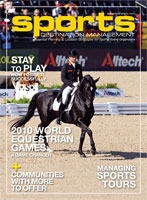As the economy ebbs and flows, everyone is looking for incontrovertible evidence that the recession is over. And while it hasn't really presented itself, the members of the hospitality and tourism industry all remain optimistic that the era of the 'stay-cation' (and haven't we all come to hate that term?) is over.
What's interesting, though, is the dynamic the fluctuating economic forces have created. Fitness club owners have reported in various industry publications that while athletes are hesitant to purchase new equipment or apparel, they're not giving up their memberships if they can help it; in fact, they're working out more often and taking advantage of things like leagues and group programs that allow them to get the best return on their dues investment. What's more, they're getting their kids involved in club-sponsored sports camps and in summer recreational offerings.
It creates what I see as a trickle-down effect that puts the sports travel industry in a unique position. While consumers might give up a standalone vacation, they continue to attend sporting events (particularly those in which their children are athletes), and to use those events as a way to take the entire family out of town. If a marathon, a regional swim meet or a soccer tournament is held in a location that offers some historical interest or fun attractions, parents and even childless couples are willing to arrange a getaway around that event. It's an arrangement that can benefit everyone, if we encourage it.
In this issue, we examine various aspects of this phenomenon, and what it means to planners, participants and service providers. The article on sports tour management provides essential insights. The articles on "Stay to Play" and "Evaluating Economic Impact" will help readers design the right kind of event contract, and to understand how local organizations evaluate the ways sports tourism pumps dollars into their local economy.
Our Regional Focus and Sports Landscape features in this issue offer ideas for new and exciting destinations. We also encourage planners to think outside the traditional map and to consider sites they hadn't thought of before (see our piece on "Communities with More to Offer") -- being a big fish in a less-than-ocean-sized market can be beneficial on all levels.
Let's do what we can to help end the stay-cation and grow the sports-cation. We all have so much to gain.


